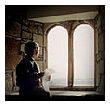
Factotum
Posted by Anne on Jul 23, 2011 in Reviews | 0 commentsFACTOTUM: MONSTER BLOOD TATTOO BOOK 3
DM Cornish
Scholastic
The lightning-wielding fulgar, Europe—the Branden Rose and Duchess-in-waiting of Naimes—threw caution to the winds at the end of Book 2, Lamplighter, to rescue Rossamünd from the hands of the black habilist, Grotius Swill.
Although Rossamünd was accused of being a monster—even his name gave away his origin as a rossamünderling, a manikin, a creature born of mud from the dark fens who has all the appearance of a human child—Europe has taken him into her service as her personal factotum. Europe is a terrifying teratologist—a monster-hunter—so it is with considerable anxiety Rossamünd awaits the results of a cruorpunxis, a monster-blood tattoo, stamped on the arm of Fransitart, his old master from the foundlingery.
Will the mark come up after a fortnight? What will it reveal? Is he man or monster?
While waiting back in the city of Brandenbrass, Rossamünd comes to the attention of Pater Maupin, the owner of a gambling den and fighting pit where dogs and monsters duel to the death. Pitying the more kindly-natured creatures trapped there, Rossamünd creates a diversion that helps them escape. Spotted, he is pursued and almost killed; he is saved only by the intervention of the Lapinduce, the Duke of Rabbits, an eons-old monster who lives in a quiet wood in the very heart of the depraved city.
Although Rossamünd escapes, Pater Maupin’s reach is much longer than even the Branden Rose realises and he vows vengeance for the damage that Rossamünd has done. After barely escaping with her life from a cleverly-planned ambush out on a monster-hunt, Europe returns with Rossamünd under her wing, determined to best Maupin whatever the cost. The scene is set for a truly enormous and complex battle, not with the monsters this time but between humans. In it all, the innocence of Rossamünd shines through; he never loses the sense of horror it is to take a life. He wins the deep love of Fransitart and Craumpalin in his childhood, so much so that the old vinegaroons do everything in their power to protect him despite their suspicions of his true nature. When the monster blood tattoo finally appears on Fransitart’s arm, the man makes an unexpected sacrifice: he has his arm removed, so that no evidence remains. Rossamünd wins the love of Europe too, a love disguised beneath her insistence that her protection of him is due to pride, not compassion.
The book ends on a curious downbeat. The climactic battle is taut, ferocious, wild and wide; brilliantly executed. And then… hmm, I’m somehow reminded of the story of Elijah and the prophets of Baal. A huge stupendously superlative victory against overwhelming odds and at the end, Elijah is not exultant but instead, depressed and fearful, he takes off into the wilderness.
That’s not the end of Elijah’s story, of course, but in parallel circumstances, it’s the end of Rossamünd’s. It doesn’t feel at all fitting.
The first of the seven plot types identified by Christopher Booker is Overcoming the Monster. Is the monster overcome in this story?
Despite the Branden Rose’s re-definition of who the monsters are, it feels curiously inconclusive. The same question hands over this book as the last two in the series. I hoped Factotum would settle the matter but it’s still there for me: what do kid readers think of the ornate baroque language?
While I personally admire the stylistic mannered writing with its medieval-cum-not-quite-steam-punk feel, its archaic words, its tapestried sentence construction, I still can’t help but wonder at the average kid’s reaction.
I really dislike being pulled out of a story world by clunky or unfamiliar wording. Here the words are so unfamiliar the choice was to continually disrupt my reading to check out the (incomplete) glossary or to read on in the hope I had enough of the sense to get the drift of what’s going on.
I wonder if I would have liked the book as a teen. I doubt it. I suspect it’s the sort of book suited mainly to well-read adults or excessively literate teenage boys who love playing clever games with language and who, at least at some point in their lives, have set off to trap the Jabberwock in a net of words.

